
april 2005
TONI NEGRI REPLIES TO ALLEGATIONS
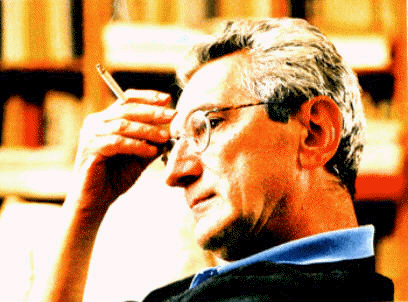
FIBRECULTURE http://www.fibreculture.org
The following is a statement
written by Toni Negri in refutation of the allegations
made against him by Keith Windschuttle in _The
Australian_ (16 March 2005): (The article is below,JB,Ed.)
Negri isolates nine points in
Windschuttle's article that he claims are totally false.
He is angered by the need to rebut a series of scandalous
accusations that contradict the truths established by
Italian judges who convicted him of some crimes but found
him totally innocent--and therefore definitively
absolved--of another series of charges.
The nine
points are as follows:
1. I never had
anything to do with the Red Brigades, neither as leader,
member, nor sympathiser. These charges were dropped after
some months (in late 1979/early 1980). Even Cossiga, who
put me in jail at the time, has now repeatedly rejected
these allegations. I have been totally absolved of these
charges. As a matter of fact, when I was in prison the
Red Brigades even condemned me to death for
disassociating myself from 'armed struggle,' along with
many other friends in Rebibbia prison.
2. I never had anything to do
with the kidnapping and murder of the Hon. Moro by the
Red Brigades. The court records hold me completely
innocent of this accusation.
3. The murders for which I
was initially accused were all revealed to be false
accusations. I was absolved of all 17! I was convicted
for 'crimes of association' and never for 'crimes of
blood.'
4. I was initially accused of being the person who telephoned the Moro family. The first expert declared my voice to be 80% compatible with the voice of the caller. Another expert demonstrated the contrary, since the voice of the caller had an accent from Marche. Subsequent trials--and the role of the penitents from the Red Brigades--revealed the truth; it was Mario Moretti who made the call (he is in fact from Marche). I was completely absolved because I had nothing to do with this. When Espresso published the disk about which _The Australian_ article speaks (with my voice from a lesson, and the voice of the caller during the days of the kidnapping-a way of inviting public opinion to judge by itself), I should have taken them to court for defamation. Unfortunately I was in a high security prison. But I was absolved nonetheless.
5. I was elected a member of parliament of the Radical Party of Marco Pannella, which, contrary to what _The Australian_ article says, is not a an extremist neo-marxist party but a party that has become ever more liberal. It was already liberal in those days (although more in the 'libertarian' mode) and today tends almost to the position of Bush. In any case, the party fought for civil liberties and due process in an era of emergency laws, which is nothing to be ashamed about either yesterday or today.
6. I did not use my liberty as a member of parliament to escape to France. I escaped only when they decided to remove my parliamentary immunity (by a majority of only 4 votes in the lower house ... the votes of the Radical Party). I had already served four and a half years in a maximum security prison. My conviction of 30 years (1983) was reduced by appeal to 13.5 years (1986), only for 'crimes of association.' The judges removed the charge of insurrection against the state, contrary to what The Australian article affirms. When I returned to Italy in 1997, I did in no way bargain for a reduction of the sentence. In fact, after my return to Rebibbia, a sentence of 3 years and 4 months was added for 'fatti di piazza' (protests in Milan during the 1970s). The total sentence was 17 years and I served it all.
7. The publication of _Empire_ in the USA does not seem to me a phenomenon of 'radical glamour' and the mention of my imprisonment in Rebibbia on the book cover was simply the truth. _Empire_ was published by Harvard University Press and cited among the seven 'next big ideas' by _Time_. Neither Harvard nor _Time_ seem to me suspects of 'radical glamour' or to have sympathies for political extremism.
8. I am not in my sixties. I am 71-almost 72-years old. I was 64 when I returned to prison in 1997. I was not put under house arrest. I did one year of full imprisonment (with common inmates), two years of 'external work' (permission to exit only for work, with interdictions against change of plans and not respecting the required hours, constant surveillance, and return to jail after work); two years of semi-liberty (nights in jail, days at home for studying with interdictions against leaving the vicinity of the house and constant surveillance); and one year of 'guarded liberty' (days and nights at home with interdictions against leaving the vicinity and going out between 10pm and 7am, with regular surveillance). I was definitively released-after having served all of my sentence-on 25 April 2003. I am free to travel and to hold courses, conferences, and seminars throughout the world. This is precisely what I have done for the past two years in major world universities (Cambridge, London, Berlin, Frankfurt, Madrid, Barcelona, Beijing, Shanghai, Buenos Aries, Rio de Janeiro, Sao Paulo, and Paris, where I teach now).
9. I do not need an entry
visa for Australia since the process has been simplified
to require the issue of an electronic travel authority at
the time of purchase of the ticket. If a visa was
necessary I don't see why I should not obtain one, given
that I have never been convicted of terrorism.
Conclusion: the
article is false from beginning to end. It is a
scandalous and vulgar act of historical revisionism.
Toni Negri
::posted on ::fibreculture:: mailinglist for australasian
::critical internet theory, culture and research
Here is The Australian text.
Keith Windschuttle:
Tutorials in terrorism
http://theaustralian.com.au/common/story_page/0,5744,12556881%255E7583,00.html
March 16, 2005
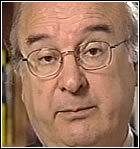 A UNIVERSITY
education in the humanities was once supposed to be a
civilising experience. But just how antiquated are the
traditional advocates of this ideal - such as Charles
Badham, professor of classics at the University of Sydney
from 1867 to 1884 - can be seen from two new developments
at Badham's old institution.
A UNIVERSITY
education in the humanities was once supposed to be a
civilising experience. But just how antiquated are the
traditional advocates of this ideal - such as Charles
Badham, professor of classics at the University of Sydney
from 1867 to 1884 - can be seen from two new developments
at Badham's old institution.
The first is the university's invitation to Antonio Negri
to speak at a conference from May 4 to 6 on Physiognomy
of Origins: Multiplicities, Bodies and Radical Politics,
hosted by the University of Sydney's Research Institute
for Humanities and Social Sciences and funded by its
school of languages and culture.
And who's Negri? Well, he was one of the organisers of the Red Brigades, the terrorist group responsible for several political assassinations in Italy, the most notorious of which was the 1979 kidnapping and murder of Italian prime minister Aldo Moro. At the time, Negri was professor of political science at the University of Padua. He was arrested and charged with 17 murders, including that of Moro, as well as armed insurrection against the state. The Italian public was shocked that an academic could be involved in such events but most astonished by one bizarre detail. Forty-five days after the kidnapping, someone sounding like Negri telephoned Moro's wife, taunting her about her husband's impending death. Nine days later his body, shot in the head, was found dumped in a city lane.
Prosecutors argued that it was 80 per cent certain the voice was Negri's but more cautious independent experts, perhaps mindful that some Red Brigade assassins were still at large, would say no more than the call belonged to the "same class" of voices. The weekly newspaper L'Espresso created a public storm when it included in its January 20, 1980, edition a vinyl record containing the call to Moro's wife along with a police-recorded sample of Negri's voice. The paper invited readers: "You make the voice test."
Awaiting trial in prison, Negri was elected to parliament on the ticket of the Marxist-led Radical Party. Claiming parliamentary immunity, he was temporarily released and used his freedom to escape to France. In absentia he was convicted and sentenced to 30 years' jail. By 1997 he had plea-bargained this down to a 13-year term for membership in an armed band, which he returned to Italy to serve.
In 2000, he became an academic celebrity in the US as co-author with Duke University literary theorist Michael Hardt of the book Empire, a Marxist-postmodernist thesis arguing that, despite the fall of the Soviet Union, a worldwide communist revolution is still on the political agenda. Part of the book's appeal on campus lay in the radical glamour of Negri's terrorist past and the cover note biography recording him as an inmate of Rebibbia prison, Rome.
Now in his 60s, Negri is reportedly still under house arrest that confines him to his Rome apartment from 7pm to 7am but apparently releases him to accept university invitations as far afield as Australia. Even though the University of Sydney has been irresponsible enough to fund his visit here, the Howard Government should reconsider whether someone convicted of crime on this scale deserves an entry visa.
| Carles Guerra: The virulent trial of the author of books, such as Empire and The Subversive Spinoza, started 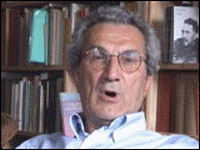 after
the kidnapping and assassination in 1978 of the
prominent Christian Democratic leader, Aldo Moro,
when the Italian government passed a series of
emergency measures that imprisoned hundreds of
people who had taken part in the demonstrations
and political action in the transalpine region in
the so-called 'Years of Lead'. Toni Negri, like
many other ex-members of Potere Operaio,
was arrested in April 1979, accused, at first, of
leading a fuzzy clandestine constellation of
terrorist groups, and later, of being the
theoretical instigator morally responsible for
action carried out by groups such as the Red
Brigades. He remained under preventive arrest
until 1983, when he was elected as a Radical
Party Deputy and obtained parliamentary immunity.
But it didn't take the Chamber of Deputies long
to abrogate his immunity and Negri fled to France
where he remained in exile until 1997. That year
he returned to Italy intending to force amnesty
for the numerous people who, like him, were still
in exile or in prison because of their political
activities during the seventies. However, he was
again imprisoned, and although shortly afterward
he was granted the Third-Degree and has been free
since last spring, "Until today,"
Carles Guerra remembers, "Toni Negri is
still the victim of an appalling and unfair trial
that prevents him from enjoying basic rights such
as a passport". after
the kidnapping and assassination in 1978 of the
prominent Christian Democratic leader, Aldo Moro,
when the Italian government passed a series of
emergency measures that imprisoned hundreds of
people who had taken part in the demonstrations
and political action in the transalpine region in
the so-called 'Years of Lead'. Toni Negri, like
many other ex-members of Potere Operaio,
was arrested in April 1979, accused, at first, of
leading a fuzzy clandestine constellation of
terrorist groups, and later, of being the
theoretical instigator morally responsible for
action carried out by groups such as the Red
Brigades. He remained under preventive arrest
until 1983, when he was elected as a Radical
Party Deputy and obtained parliamentary immunity.
But it didn't take the Chamber of Deputies long
to abrogate his immunity and Negri fled to France
where he remained in exile until 1997. That year
he returned to Italy intending to force amnesty
for the numerous people who, like him, were still
in exile or in prison because of their political
activities during the seventies. However, he was
again imprisoned, and although shortly afterward
he was granted the Third-Degree and has been free
since last spring, "Until today,"
Carles Guerra remembers, "Toni Negri is
still the victim of an appalling and unfair trial
that prevents him from enjoying basic rights such
as a passport". |
Keith Windschuttle Continues:The second development is a new book out of the same university's history department that celebrates, in part, the work of Ward Churchill of the University of Colorado. The book describes Churchill as a "Native American activist and scholar".
Last month, Churchill briefly became the most famous, and most reviled, academic in the US. Shortly after September11, 2001, he wrote an essay saying those who died in New York's World Trade Centre deserved their fate. They were "a technocratic corps at the very heart of America's global financial empire" who were at the time "busy braying incessantly into their cell phones, arranging power lunches and stock transactions". Churchill added: "If there was a better, more effective or in fact any other way of visiting some penalty befitting their participation upon the little Eichmanns inhabiting the sterile sanctuary of the twin towers, I'd really be interested in hearing about it."
At the time, these remarks escaped public notice and Churchill expanded his essay into a book on the subject, titled On the Justice of Roosting Chickens. In February this year, Churchill was scheduled to give a guest lecture at Hamilton College, New York. However, this followed close on the same college's employment of Susan Rosenberg, a convicted felon and former member of 1960s terrorist group the Weather Underground. Disaffected staff and students publicised the appointments and The Wall Street Journal and Fox News took up the story.
Churchill's "little Eichmanns" comment became public and he was excoriated not only for his offence to all of those who died but also for his implicit anti-Semitism. The governor of Colorado called for Churchill's dismissal but only succeeded in forcing his resignation as head of the university's ethnic studies department. He remains a tenured professor. During the media furore, other aspects of Churchill's background quickly became public. He was accused of academic misconduct, both in misrepresenting himself as a Native American to gain his university post and in his writings about American history.
The American Indian Movement Grand Governing Council issued a statement saying: "Ward Churchill has fraudulently represented himself as an Indian and a member of the American Indian Movement ... and has been masquerading as an Indian for years behind his dark glasses and beaded headband."
Thomas Brown of Lamar University, Texas, accused him of inventing the claim that the American Army in 1867 had deliberately infected the Mandan tribe with smallpox. Earlier, a University of New Mexico specialist in Indian law, John LaVelle, had accused Churchill of fabricating evidence in no fewer than six books and 11 published articles.
Meanwhile in Australia, Churchill is being presented as a scholarly authority on the Aborigines. In the newly released anthology Genocide and Settler Society, editor Dirk Moses of the University of Sydney's history department quotes Churchill's 1997 book A Little Matter of Genocide as one of his main sources on the Tasmanian Aborigines. Churchill compares the fate of the Tasmanians with that of the Jews at the hands of the Nazis.
Moses contrasts this thesis with what he calls the "naive paean to British expansion" of Hannah Arendt, who denied the Nazi comparison and commended the British for bringing civilisation to the indigenous people of the US and Australia. Arendt was one of the most formidable intellectuals of the 20th century who wrote a widely admired book on the trial of Adolf Eichmann, the architect of Hitler's project to exterminate the European Jews.
To Moses, however, she is no match for Churchill. Another essayist in the same book, Henry Reynolds, also cites Churchill as one of the academic authorities who argue that what happened in Tasmania amounted to genocide. A third contributor, Paul Bartrop, quotes Churchill as a reliable source on the massacre of Native Americans in Colorado.
ZNet Commentary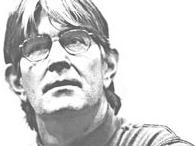 Who's The Terrorist? March 10, 2005 By Ward Churchill Once again what I have said has been turned into the opposite of itself. First, Dan Caplis, Craig Silverman and numerous other right-wing media spinmeisters asserted that I "advocated" terrorist attacks on the United States in my Op-Ed piece of Sept. 12, 2001. Even a casual reading of that piece, as well as the 300-page book On the Justice of Roosting Chickens in which I more fully explicated and documented my argument, reveals that I did not advocate such attacks. Rather, I pointed out that they were and will continue to be the inevitable result of a U.S. foreign policy that disregards the rule of law and results in massive death and destruction abroad. Next, the dynamic duo and their colleagues attempted to discredit me through an endless stream of personal attacks. These have failed because the facts, even though not reported in the media, do not support their assertions. Now, in both a paid ad and a prominently featured Op-Ed piece March 5 in the News ("Churchill's active advocacy of violence demands his firing"), Caplis and Silverman have resorted to the outright lie that I have actively sought to incite "violent revolution." I have done no such thing. To the contrary, what I have consistently advocated over the years is the rule of law. The great bulk of my scholarly work has been devoted to documenting the United States' disregard for law and the resulting violence it has perpetrated both domestically and internationally. I believe that such practices inevitably breed violence in response, and that the most effective way to ensure the security of all peoples is adherence to the Constitution and international law, particularly the laws of war and fundamental human rights law. As citizens, it is our collective responsibility to ensure such compliance with law. This is the actual meaning of the quote on Arabs misrepresented by Caplis and Silverman in both their ad and their Op-Ed. My point was that it is our job to halt the criminal conduct of the U.S. government, rather than leaving the task to those from other countries who suffer the consequences of its illegalities. Following the position articulated by Supreme Court Justice Robert H. Jackson at Nuremberg in 1945, I believe that we have not only the right but the legal obligation to compel lawful behavior from the government that is acting in our name. I document the systemic violence perpetrated by the U.S. government in the hope that Americans will take this responsibility to heart and use political means to change government policy. I would vastly prefer that this happen through nonviolent means. However, I cannot say that nonviolence is the only legitimate response to systemic violence. The principle of self-defense is not mysterious: When one is subjected to aggression, it is the perpetrator, not the victim, who dictates the terms of engagement. Although I am plainly no pacifist, I have never advocated terrorist attacks on Wall Street, downtown Seattle, or anywhere else. To make it appear otherwise, Caplis and Silverman have taken material out of context and turned it on its head. My comments in this regard, made to a small group of young anarchists gathered in a Seattle bookstore, went to the idea that they would not accomplish anything useful by marginalizing themselves and engaging in random acts of sabotage along the social periphery. Drawing upon German theorist Rudi Dutschke's concept of "a long march through the institutions," I therefore proposed the alternative that they attempt to work from within the institutional setting, as I myself have done. The "weapons" I referred to were young people's own consciousness and capacity to transmit it. Along the way, I also pointed out that as relatively privileged Euro-Americans, they were ideally situated to undertake such a project. Caplis and Silverman are seeking for their own reasons to con the public into believing that I am an active proponent of terrorism. This is not only false, it is extraordinarily dangerous. By framing my statements as they have, and then repeatedly broadcasting their spin to a broad audience, there is an obvious possibility that they might actually precipitate an act of terror by some unbalanced individual. Should this turn out to be the case, the responsibility will be theirs, not mine. Ward Churchill is a professor of ethnic studies at the University of Colorado at Boulder. |
 Institutions that
have hosted the likes of Negri and Churchill commonly
defend themselves on grounds of free speech, as if it
would be illiberal to deny such political activists a
platform. In reality, by lowering the bar to accommodate
people with so little concern for civilised values,
universities betray the intellectual and moral standards
they were founded to preserve.
Institutions that
have hosted the likes of Negri and Churchill commonly
defend themselves on grounds of free speech, as if it
would be illiberal to deny such political activists a
platform. In reality, by lowering the bar to accommodate
people with so little concern for civilised values,
universities betray the intellectual and moral standards
they were founded to preserve.
Keith Windschuttle is author of, among other books,
The Fabrication of Aboriginal History (Macleay Press,
2002) and The White Australia Policy (Macleay Press,
2004).
*************************************
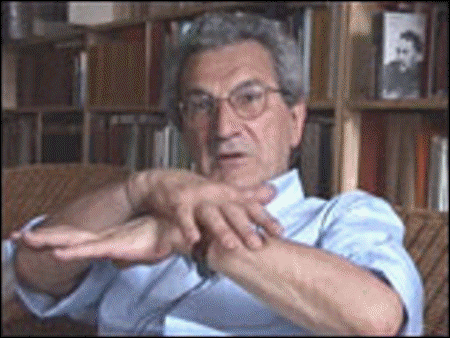
A series of films called Thought in
motion, movements of thought ended last October 10th
with the presentation of N for Negri, a
documentary directed by the artist and art critic Carles
Guerra in which the Italian political philosopher
dissects the age of thought that followed the revolutions
of the late seventies. Organised alphabetically (every
letter stands for a concept, for instance, d: detection,
s: subsumption, …), the documentary was recorded on
the evening of June 6, 2002, at Toni Negri's home in
Rome, when the Italian thinker was still under the house
arrest that compelled him to sleep in Rebibbia Prison
every night.
Originally recorded in Italian, Carles Guerra's interview of Toni Negri has already been subtitled in Spanish, thanks to the collaboration of Arteleku - Gipuzkoa Provincial Government, and in English, through Grey Room magazine. As the title suggests -N for Negri- Carles Guerra's documentary is organized like an alphabet in which every letter corresponds to one or several words or expressions, alternating references to analytical notions of Negri's works (i: Imperio (empire); m: multitude) with a series of terms that remind the Italian thinker of very intimate and intense experiences lived by him (e: exile; d: detention/prison). Before the interview, Carles Guerra had prepared a selection of words, but there were some letters - such as "a" or "q" - for which he had found no specific concept. "It was Toni Negri himself," recalls Carles Guerra, "Who provided me with the solution, he proposing terms like Augustine (for the letter 'a') or the Latin word quantum (from which capital is derived) for the letter 'q'".
During the more than 130 minutes which N for Negri lasts, the Italian thinker presents many of the theoretical analyses he has developed in works such as The Train from Finland, Constituent Power (essay on modern age alternatives), Exile or Nomadic Truths: from the ability capitalism has historically shown for 'vampirizing' and neutralizing social, political and technological transformation processes generated at the margin of the System (a question he deals with when talking about concepts like biopower or subsumption) to the emergence and consolidation of a diffuse but organised multitude (made up of a wide variety of independent but networked agents) that is able to reappropriate the production tools of the collective intelligence. In his long and intense conversation with Carles Guerra, Negri also analyses, among other matters, the new migratory phenomena, the difference between exodus and exile (two situations that converge in the figure of the political refugee), the search for organizational models to re-think and re-invent political affiliation, the vision of the future as "an infinite openness" where nothing is predetermined ("everything is built every second") or the subversive reelaboration of the Marxist notion of "general intellect" (which can be conceived as an instrument for sabotaging the System).
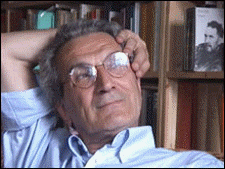 Thanks
to his knowledge and command of Rhetoric - "I have
never met anyone with oratorical skill like his",
assured Carles Guerra - the interview was recorded almost
in real time. There are only small cuts due to technical
or incidental causes, so that composition and later
editing was reduced to basic elements. In this sense,
Carles Guerra remembered that in the early 60s, Toni
Negri - who at that time was starting out as a professor
of State Theory at Padua University - was already at the
doors of large factories with a megaphone urging workers
to rebel against their employers with his persuasive
fascinating speech. In fact, Negri can be considered one
of the main theoretical driving forces of the social and
intellectual revolution that decreed the end of factory
in the classical sense (as an enclosed, self-ruled
territory, with very strict hours and completely
oblivious to leisure time) and a restricted concept of
work that circumscribes production and creative activity
within the scope of labour.
Thanks
to his knowledge and command of Rhetoric - "I have
never met anyone with oratorical skill like his",
assured Carles Guerra - the interview was recorded almost
in real time. There are only small cuts due to technical
or incidental causes, so that composition and later
editing was reduced to basic elements. In this sense,
Carles Guerra remembered that in the early 60s, Toni
Negri - who at that time was starting out as a professor
of State Theory at Padua University - was already at the
doors of large factories with a megaphone urging workers
to rebel against their employers with his persuasive
fascinating speech. In fact, Negri can be considered one
of the main theoretical driving forces of the social and
intellectual revolution that decreed the end of factory
in the classical sense (as an enclosed, self-ruled
territory, with very strict hours and completely
oblivious to leisure time) and a restricted concept of
work that circumscribes production and creative activity
within the scope of labour.
Starting from this premise, Negri explains in Carles Guerra's documentary his own notion of 'living labour' that proposes that production and creation of wealth - both material and immaterial - in contemporary society is not only generated by activities within the scope of labour, but also by many other situations in our daily lives: from social cooperation networks which benefit the business fabric to cognitive, emotional and relational labour. Thus, he breaks away from the traditional Marxist concept of productive and unproductive work and the political division between the employed, self-employed and unemployed. According to Negri, these theoretical categories do not take the power of Capital to participate in all facets of life (not only economic and/or labour) into account and that, moreover, do no help to interpret a world that tends more and more toward the absolute intellectualisation of work.
This documentary was recorded shortly after the publication of the first edition of Empire, an influential book by Toni Negri and Michael Hardt in which the political and economic order which has spread throughout the world is defined as a new pattern of imperialism based on the monopolization of weapons (allowing unilateral legitimisation of the use of force, as clearly demonstrated by the attack on Iraq), currency (imposition of transnational financial and commercial rules), language (English as the universal language) and information (control of communications media and technologies). The Empire of the Age of Globalisation replaces the sovereignty of Nation States with a new type of sovereignty that is no longer based on physical borders, but on a decentralized machinery with no established territory where it is pointless to talk about the traditional levels of the development of society ("the Third World is in the First and vice versa," assures Negri in the interview). "Something that seems to me to be very significant," pointed out Carles Guerra, is that the publication of Empire coincided with the premiere of the film Gladiator, a terrible film, but which anticipates today's world through a scenographic recreation that represents Imperial Rome as if it were New York".
The Series were screened
in October 2003
www.unia.es/.../ezine02/
ezine07/oct03.html